Nicola Cornick's Blog, page 26
September 23, 2011
Does Historical Accuracy Spoil a Good Story?
The new series of Downton Abbey hit UK screens last Sunday night (I understand that it is due to show in the US in the New Year) and, perhaps inevitably, aroused once again the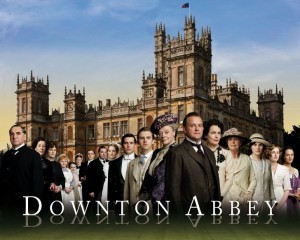 debate about whether or not the programme is an authentic depiction of Edwardian life. Historian A N Wilson branded the series "b*******" in an interview on BBC Radio, claiming that it was a sanitised version of the past and a fantasy. "It's worth emphasising how dirty and how smelly life was for almost everybody before about 1950." He said. Wilson has spoken out about the series before, saying that it glorifies "an ordering of society that was hateful in real life." He suggested that a programme about the real life experience of Edwardian servants might have been very interesting.
debate about whether or not the programme is an authentic depiction of Edwardian life. Historian A N Wilson branded the series "b*******" in an interview on BBC Radio, claiming that it was a sanitised version of the past and a fantasy. "It's worth emphasising how dirty and how smelly life was for almost everybody before about 1950." He said. Wilson has spoken out about the series before, saying that it glorifies "an ordering of society that was hateful in real life." He suggested that a programme about the real life experience of Edwardian servants might have been very interesting.
Well, yes. I would probably have watched that, along with a few hundred thousand other people who fancied seeing a documentary about life in service in Edwardian England. It would have been educational, informative and dare I say it, worthy. It would not have been a slice of escapist entertainment. A N Wilson himself acknowledges this: "Of course it's harmless fun," he said, "and I'm not going to suggest that people sitting down on their sofas need to be engaged in gritty Marxist realism on a Sunday evening." Quite. So what is he criticising? The fact that the fictional tale of Downton Abbey is set within a historical framework that he asserts is inauthentic? He is not alone in this. In an article in the Daily Telegraph Professor Alison Light is quoted as saying that members of Edwardian aristocracy were "mean and vindictive" and that the programme is a liberal fantasy, a nostalgia for a time that did not exist.
 Firstly I have to hope that the Telegraph misquoted Professor Light because to make such a sweeping generalisation about the entire Edwardian aristocracy seems extraordinary. Surely there must have been pleasant, even generous, members of the nobility just as there must have been mean and vindictive ones, given that even aristocrats are people and people come in all shades of character. Secondly, to expect a television programme such as Downton Abbey to reflect history as a documentary would, or to expect a historical romance to read like a work of non-fiction is of course spectacularly to miss the point. A historical novel or TV series is a work of fiction existing within a historical framework. And so we come down to the question of just how "accurate" that framework has to be. This is where I get irritated by critics who argue that Downton Abbey does not reflect the experience of the majority of servants in Edwardian England or that a historical romance that features, say, a woman inheriting a title and estate isn't representative because legally most women had no property rights at all.
Firstly I have to hope that the Telegraph misquoted Professor Light because to make such a sweeping generalisation about the entire Edwardian aristocracy seems extraordinary. Surely there must have been pleasant, even generous, members of the nobility just as there must have been mean and vindictive ones, given that even aristocrats are people and people come in all shades of character. Secondly, to expect a television programme such as Downton Abbey to reflect history as a documentary would, or to expect a historical romance to read like a work of non-fiction is of course spectacularly to miss the point. A historical novel or TV series is a work of fiction existing within a historical framework. And so we come down to the question of just how "accurate" that framework has to be. This is where I get irritated by critics who argue that Downton Abbey does not reflect the experience of the majority of servants in Edwardian England or that a historical romance that features, say, a woman inheriting a title and estate isn't representative because legally most women had no property rights at all.
To my mind historical fiction is all about the specific and the particular. It is the specific story of a character or group of characters within a particular setting. Yes, that setting has to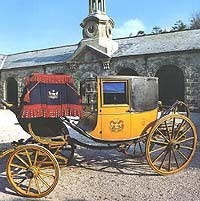 be historically accurate in the sense that it should take those characters eight days rather than two to travel from London to the Highlands of Scotland at the beginning on the 19th century, for example. But if there is even one example of a woman inheriting a title (and there are a great deal more than that) or one happy Edwardian servant who is well-treated by their employer (and from servants' letters one can gather that there were a number) then that establishes a framework in which a historical drama can work. Brother Cadfael, the sleuthing monk in Ellis Peters' hugely successful historical crime series was forever stumbling over a herbal clue in order to solve a murder and it did not bother me that I had read of no medieval chronicler who did this in real life. In the 12th century there were herbs, there were murders and there were monks. That was good enough for me. Let's not forget as well that all historical writing is interpretation anyway; if there is one thing that I remember from my MA studies it is that everyone has an angle and an opinion. Non-fiction historical writers speculate to join up the "facts" and they do so from vastly differing perspectives.
be historically accurate in the sense that it should take those characters eight days rather than two to travel from London to the Highlands of Scotland at the beginning on the 19th century, for example. But if there is even one example of a woman inheriting a title (and there are a great deal more than that) or one happy Edwardian servant who is well-treated by their employer (and from servants' letters one can gather that there were a number) then that establishes a framework in which a historical drama can work. Brother Cadfael, the sleuthing monk in Ellis Peters' hugely successful historical crime series was forever stumbling over a herbal clue in order to solve a murder and it did not bother me that I had read of no medieval chronicler who did this in real life. In the 12th century there were herbs, there were murders and there were monks. That was good enough for me. Let's not forget as well that all historical writing is interpretation anyway; if there is one thing that I remember from my MA studies it is that everyone has an angle and an opinion. Non-fiction historical writers speculate to join up the "facts" and they do so from vastly differing perspectives.
Sadly this Downton-berating smacks to me very much of romance-bashing. Find something entertaining, escapist and successful, something that is popular with thousands of viewers or readers, and there will always be people stepping up to deplore it. Let's not confuse our apples and pears here. Plenty of us enjoy historical drama. Plenty of us enjoy historical documentaries. We like historical fiction; we like historical non-fiction. But we don't expect them to resemble each other and if we are wise we don't make invidious comparisons between them.
©2011 Nicola Cornick. All Rights Reserved.
.September 21, 2011
Shana Galen at the Word Wenches!
Today at the Word Wenches my guest is the lovely Shana Galen, talking about her fabulous new book Lord and Lady Spy and the issue of miscarriage and infertility in the Regency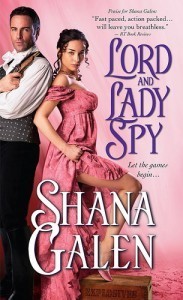 period. Do you enjoy "issue" romances that tackle difficult and emotional subjects? Come and join the debate at the Word Wenches for the chance to win a copy of Lord and Lady Spy! (Gorgeous cover, isn't it!)
period. Do you enjoy "issue" romances that tackle difficult and emotional subjects? Come and join the debate at the Word Wenches for the chance to win a copy of Lord and Lady Spy! (Gorgeous cover, isn't it!)
©2011 Nicola Cornick. All Rights Reserved.
.September 15, 2011
The Song of the Western Men
Cornwall, the most westerly of English counties and ancestral home of the Cornick family, is one of my favourite places. Like the other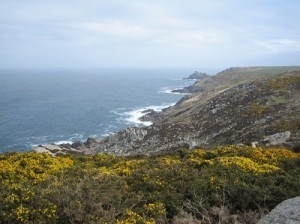 wild Celtic parts of the British Isles it is blessed with stunning scenery and vivid legends. Cornwall also has its own "national anthem." "The Song of the Western Men" was written in 1824 byRobert Steven Hawker who was a poet, antiquarian and clergyman. It was thought to have been based on an earlier song written about a Cornish rebellion of 1497 or on another song of 1807 written at the height of the threat of Napoleonic invasion when the men of Cornwall swore to protect their native land.
wild Celtic parts of the British Isles it is blessed with stunning scenery and vivid legends. Cornwall also has its own "national anthem." "The Song of the Western Men" was written in 1824 byRobert Steven Hawker who was a poet, antiquarian and clergyman. It was thought to have been based on an earlier song written about a Cornish rebellion of 1497 or on another song of 1807 written at the height of the threat of Napoleonic invasion when the men of Cornwall swore to protect their native land.
 "The Song of the Western Men" tells of events that took place in 1688 when Bishop Jonathan Trelawny was imprisoned in the Tower of London by King James II. Trelawny had been born at Pelynt, the son of the 2nd Baronet of Trelawne, an old Cornish family that had supported th Royalist side during the English Civil War. Jonathan Trelawny and six other bishops petitioned against James II's Declaration of Indulgence granting religious toleration to Catholics and as a result he was imprisoned for seditious libel. Trelawny was held for three weeks before trial, then tried and acquitted. This led to great celebrations, with bells being rung in his home parish of Pelynt. The march on London that is described in the song only reached as far as Bristol before Trelawny was acquitted. He became Bishop of Exeter and later Bishop of Winchester.
"The Song of the Western Men" tells of events that took place in 1688 when Bishop Jonathan Trelawny was imprisoned in the Tower of London by King James II. Trelawny had been born at Pelynt, the son of the 2nd Baronet of Trelawne, an old Cornish family that had supported th Royalist side during the English Civil War. Jonathan Trelawny and six other bishops petitioned against James II's Declaration of Indulgence granting religious toleration to Catholics and as a result he was imprisoned for seditious libel. Trelawny was held for three weeks before trial, then tried and acquitted. This led to great celebrations, with bells being rung in his home parish of Pelynt. The march on London that is described in the song only reached as far as Bristol before Trelawny was acquitted. He became Bishop of Exeter and later Bishop of Winchester.
The Song of the Western Men
A good sword and a trusty hand!
A merry heart and true!
King James's men shall understand
What Cornish lads can do!
And have they fixed the where and when?
And shall Trelawny die?
Here's twenty thousand Cornish men
Will know the reason why!
Chorus:
And shall Trelawny live?
And shall Trelawny die?
Here's twenty thousand Cornish men
Will know the reason why!
Out spake their Captain brave and bold:
A merry wight was he:
'If London Tower were Michael's hold,
We'd set Trelawny free!
'We'll cross the Tamar, land to land:
The Severn is no stay:
With "one and all," and hand in hand;
And who shall bid us nay?
Chorus:
And shall Trelawny live? , etc.
'And when we come to London Wall,
A pleasant sight to view,
Come forth! come forth! ye cowards all:
Here's men as good as you.
'Trelawny he's in keep and hold;
Trelawny he may die:
But twenty thousand Cornish bold
Will know the reason why!'
Chorus:
And shall Trelawny live? , etc.
There is a link here to a rousing version of the song!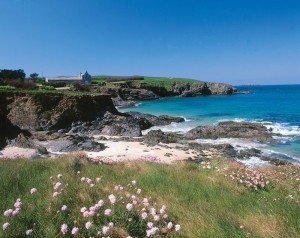
©2011 Nicola Cornick. All Rights Reserved.
.September 12, 2011
A Slice of Potato History!
Did you know that Marie Antoinette once wore a headdress woven with potato flowers for a ball? Never mind let them eat cake, let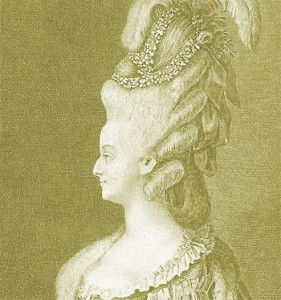 them wear potatoes! Today at the Word Wenches blog I am talking about the history of the potato and how the upper class Brits and French scorned it whilst the Americans had the sense and good taste to welcome it as a foodstuff. Come along and share your favourite potato recipe!
them wear potatoes! Today at the Word Wenches blog I am talking about the history of the potato and how the upper class Brits and French scorned it whilst the Americans had the sense and good taste to welcome it as a foodstuff. Come along and share your favourite potato recipe!
©2011 Nicola Cornick. All Rights Reserved.
.September 9, 2011
Letters to Juliet and a real life love story
This week I watched Letters to Juliet which I thought was a charming film. I loved that the idea was based on the Club di Giulietta,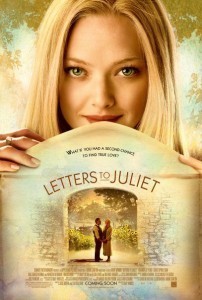 the real life group of volunteer "secretaries" who answer letters sent to Shakespeare's heroine from lovers all over the world.
the real life group of volunteer "secretaries" who answer letters sent to Shakespeare's heroine from lovers all over the world.
The story also reminded me of a love story in my own family that was very similar to the one depicted in the film. In the 1920s my paternal grandfather was twenty one and was a schoolmaster working on the island of Cyprus, which was at that time under British colonial rule. He fell in love with the eighteen year old daughter of a diplomat. Not only were they both very young but she was far above him on the social scale. Her father refused permission for the two of them to marry and in time my grandfather returned to England, married my grandmother and had two children. It was only when he was a widower in his seventies that he advertised to find his lost love and the two of them were reunited and finally able to marry. It isn't only in films that lovers meet again after fifty years and live happily ever after! This family story is one of the reasons why I am an unashamed romantic.
©2011 Nicola Cornick. All Rights Reserved.
.September 7, 2011
The Battle of Borodino
Today is the anniversary of the Battle of Borodino in 1812 and I am blogging about it over at the UK Regency Authors blog where we 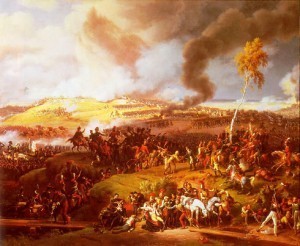 will be talking about the wonderful "Russian Regencies" written by Dinah Dean. If you are a DD fan come and join us to share your favourites!
will be talking about the wonderful "Russian Regencies" written by Dinah Dean. If you are a DD fan come and join us to share your favourites!
©2011 Nicola Cornick. All Rights Reserved.
.September 4, 2011
Rags to Riches
Today on the Hoydens and Firebrands Blog I am talking about the rags to riches rise of the Craven family of Ashdown in the late 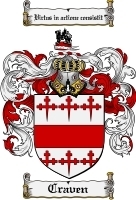 sixteenth and early seventeenth century. Sir William Craven, the "Dick Whittington of Yorkshire" went from living in a one roomed cottage to being Lord Mayor of London and accumulating a fortune that ran into billions. Read about his story and the ennoblement of his family here!
sixteenth and early seventeenth century. Sir William Craven, the "Dick Whittington of Yorkshire" went from living in a one roomed cottage to being Lord Mayor of London and accumulating a fortune that ran into billions. Read about his story and the ennoblement of his family here!
©2011 Nicola Cornick. All Rights Reserved.
.September 2, 2011
The National Readers Choice Award!
Yesterday I went up to Richmond, to the Harlequin Mills & Boon offices, to collect my NRCA trophy and to have lunch with editors Kimberley Young and Linda Fildew. It had always  been my intention to attend the RWA Conference in New York this year and I was deeply disappointed when pet and other family emergencies meant that I had to cancel at the last minute. Having a RITA and a NRCA nomination would have made the trip extra special and I was so looking forward to meeting up with author friends and readers. It wasn't to be, but after the disappointment of cancelling the conference and the miserable way in which Cunard refused to re-arrange my "holiday-of-a-lifetime" cruise, it was extra nice to be able to celebrate with Kim and Linda! Here I am proudly clutching the NRCA trophy for best historical, awarded to Whisper of Scandal. I loved writing Whisper and was so proud that it received this recognition.
been my intention to attend the RWA Conference in New York this year and I was deeply disappointed when pet and other family emergencies meant that I had to cancel at the last minute. Having a RITA and a NRCA nomination would have made the trip extra special and I was so looking forward to meeting up with author friends and readers. It wasn't to be, but after the disappointment of cancelling the conference and the miserable way in which Cunard refused to re-arrange my "holiday-of-a-lifetime" cruise, it was extra nice to be able to celebrate with Kim and Linda! Here I am proudly clutching the NRCA trophy for best historical, awarded to Whisper of Scandal. I loved writing Whisper and was so proud that it received this recognition.
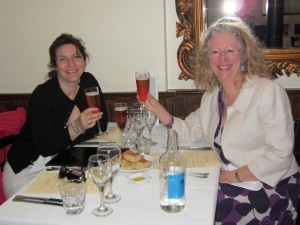 Afterwards, Kim, Linda and I went to a lovely restaurant for a celebratory lunch – and delicious Kir Royale cocktails! I'd like to thank them for treating me. It was a very special occasion! Also I am very grateful to the OKRWA for sponsoring the National Readers Choice Awards. I also feel so happy to know such wonderful readers and fellow writers who make this business so much fun to be involved with. Thank you!
Afterwards, Kim, Linda and I went to a lovely restaurant for a celebratory lunch – and delicious Kir Royale cocktails! I'd like to thank them for treating me. It was a very special occasion! Also I am very grateful to the OKRWA for sponsoring the National Readers Choice Awards. I also feel so happy to know such wonderful readers and fellow writers who make this business so much fun to be involved with. Thank you!
©2011 Nicola Cornick. All Rights Reserved.
.August 29, 2011
Forbidden Inspiration!
Today over at the Word Wenches Blog I am talking about the research behind my current work in progress, Forbidden. Here is a sneak peek of the cover! I love it! Come and join me to 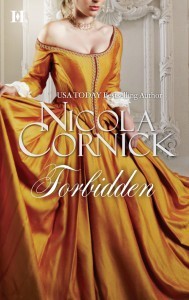 hear all about the mysterious Savernake Estate and how it made the perfect inspiration for Templemore.
hear all about the mysterious Savernake Estate and how it made the perfect inspiration for Templemore.
©2011 Nicola Cornick. All Rights Reserved.
.August 27, 2011
The Flying Scotsman
On this day in 1784 James Tytler undertook the first balloon ascent in Britain. The flight took place at Carlton Hill in Edinburgh. 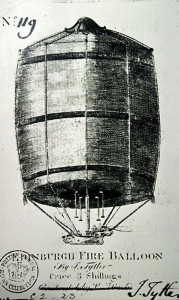
James Tytler was the son of a minister, born in near Brechin in 1745. As a young man he taught himself basic science and medicine before becoming apprenticed to a surgeon. He went on to take medical classes at Edinburgh University and for a short time was a ship's surgeon aboard the whaling ship Royal Bounty. He also set up his own unsuccessful pharmacy business. His real talent lay in writing and editing, and he would publish on a home-made printing press whilst simultaneously working on many unsuccessful business ideas that frequently plunged him into deep debt. He married young, had lots of children, had lots of affairs and divorced in 1788.
It was whilst working as editor of the second edition of the Encyclopaedia Britannica that Tytler read about the experiments of the Montgolfier brothers in France who had flown a hot air balloon. Tytler set out to see if he could do the same thing and created the Grand Edinburgh Fire Balloon. Early attempts to fly the balloon were dogged by bad weather, technical problems, hostility in the press and a superstitious mob who attacked the balloon. Eventually it was launched on a successful flight. The Edinburgh Evening Courant recorded: "the balloon, together with the projector himself, and basket in which he sat, were fairly floated". The balloon was tethered but reached a height of 350 feet. Two days later, on the 27th August, Tytler travelled a half mile in the balloon and a 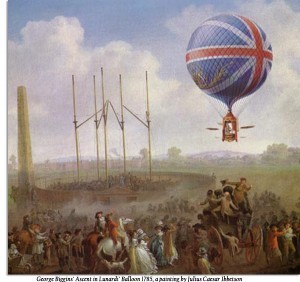 few days after that made another ascent. Unfortunately on his final flight in October 1784 his balloon crashed before a crowd of paying spectators and his career as an aeronaut was over.
few days after that made another ascent. Unfortunately on his final flight in October 1784 his balloon crashed before a crowd of paying spectators and his career as an aeronaut was over.
Tytler's colourful life ended with him being arrested for sedition for his radical writings. He fled to Ireland and from there to America where he lived in Salem, Massachusetts, continuing to scrape a living through his journalism. He turned to drink and drowned whilst inebriated in 1804. His ballooning exploits were eclipsed by those of the Italian showman Vincenzo Lunardi in London and the English aeronaut, James Sadler from Oxford but Tytler can still claim the title of the first British balloonist.
©2011 Nicola Cornick. All Rights Reserved.
.


